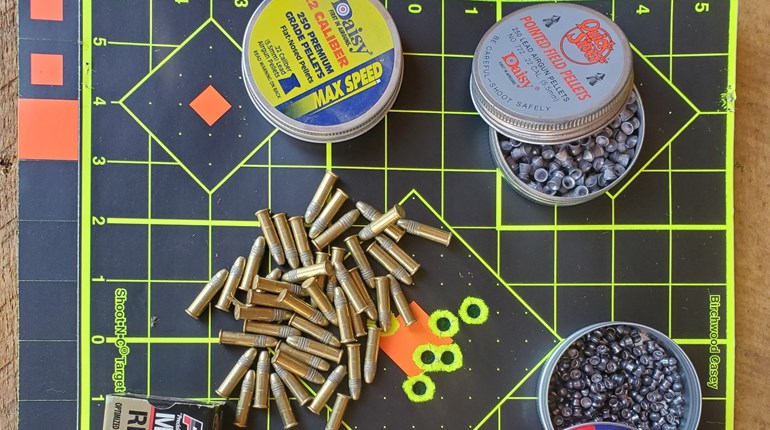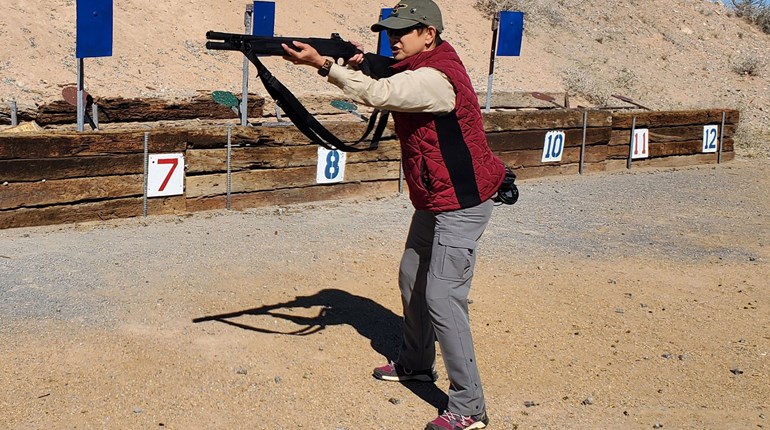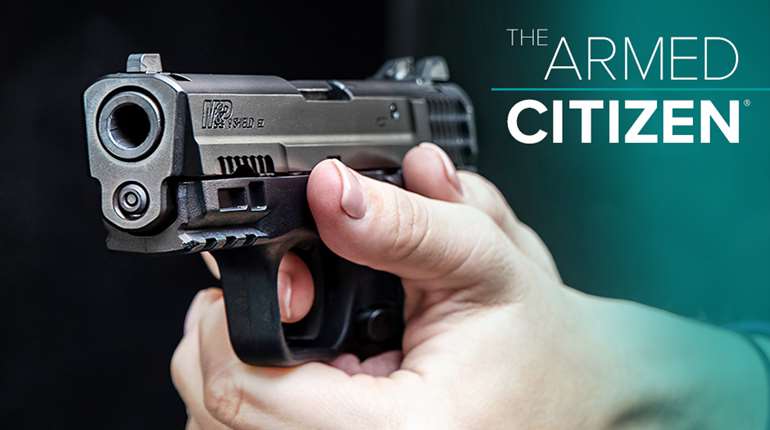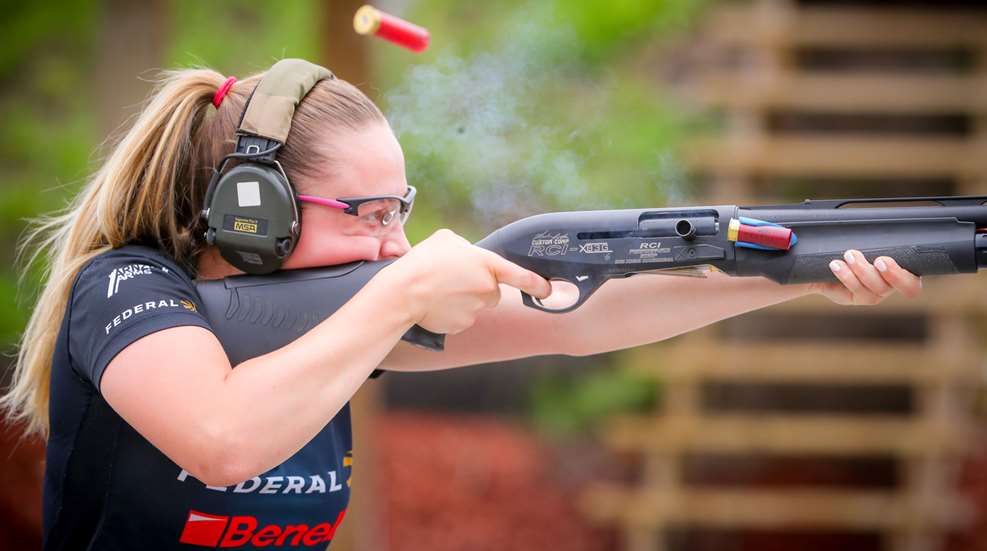
I recently participated in a Ladies Day shoot at a nearby range, which included several professional female shooters, and boy, was I impressed! Their focus on technique, concentration and skill was fascinating. By the end of the morning I had picked up a few tips, especially about how to handle a higher-caliber handgun (as I am currently in the market for a .45-cal. 1911). I’ve played various sports over the years, and if there's one thing I’ve noticed, it’s that when you compete with better athletes, it has a positive impact on your game. Not only can you pick up tips from watching them, but they can give you constructive criticism after watching you.
Ready to up your game? Check out these tips from some of the country’s top female competitive shooters.
Start with a plan. “This tip may seem obvious but many people don’t create a training plan,” says Gabby Franco, Olympian, former Top Shot Competitive Shooter, and Walther Arms brand ambassador. “Most of the time people just go to the range and shoot and that’s it. But especially now with the ammo shortage it’s more important than ever to value your time and your resources.”
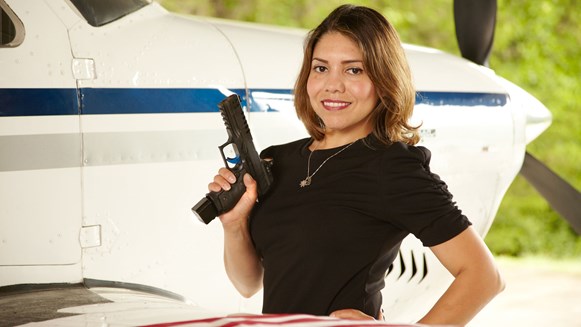
Gabby suggests that you train for at least one hour a week at the gun range, and focus on one technique at a time. For instance, if you’re practicing your draw, dedicate that training session to practicing your draw quickly and shooting accurately.
“Your training plan should act like a road map and take you where you want to go,” says Gabby, explaining that the difference between “working memory” and “long-term memory.” For example, during training you employ your working memory, and after several repetitions, a particular technique gets embedded in your long-term memory. Ideally, she says, you should focus on one technique during your practice, repeating it several times for 30 minutes to one hour each session. “That constant repetition is going to help your brain transfer this knowledge from the working memory to the long-term memory.”
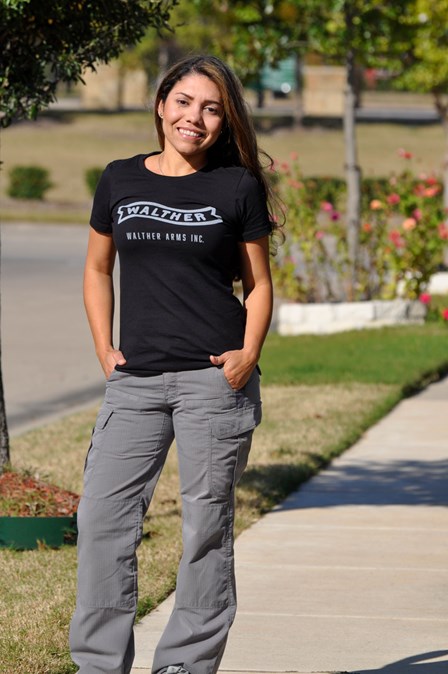
Franco notes that it is all right to work on several techniques at one time, but it will take you longer to master each skill. “Once a skill is embedded in your long-term memory, you will perform that action faster and efficiently. Your brain will know exactly how to do it,” she says, adding that this recollection time is critical if you’re in shooting competitions, where seconds can make the difference between a podium finish or finishing lower.
You can use your phone or a notebook, but I like the Shooting Journal offered by A Girl & A Gun Women’s Shooting League.
Change your focus. Franco says she sometimes sees people focusing so much on trying to hit the bullseye that they forget about the technique. “I see shooting as a mathematical equation,” she says. “When you have a problem in math, you don’t focus on the result. You need to solve the problem first, then, you can make necessary adjustments.” Franco suggests instead of focusing so much on hitting the bullseye, you should focus on the steps you are taking to accomplish that goal. “You will learn what you are doing right and wrong when you follow this principle.”
Franco recommends asking yourself the following questions: What steps are you taking in your technique? How well are you applying the shooting fundamentals? Examining all the details of your technique will give you a lot more information. “If you focus on how you are working through the equation, which is your technique, this will result in much better results and improvement.”
Prioritize your weak areas. “For me, I started becoming a lot more successful when I started to focus on practicing the areas that I wasn’t nearly as good at,” says 17-year-old Dakota Overland, USPSA Multi-Gun Ladies Champion, and brand ambassador for Benelli and Federal Premium Ammunition. “Everybody enjoys practicing the things that they’re good at,” says Overland. “It’s more fun doing things that way, and less work.” But she’s quick to add, “You’re not really going to see a whole lot of improvement if you just continue to practice the things that you’re good at because you’re still going to fall off in those weak areas.”
Overland says that last year she was trying to work on her movement and transitions between guns, because once you figure out the shooting it’s not too hard to keep up with that. “Movement was a weak area for me,” she admits. “I noticed that I was losing time in competitions, so I spent a lot of time practicing my movement so I can decrease my time.”
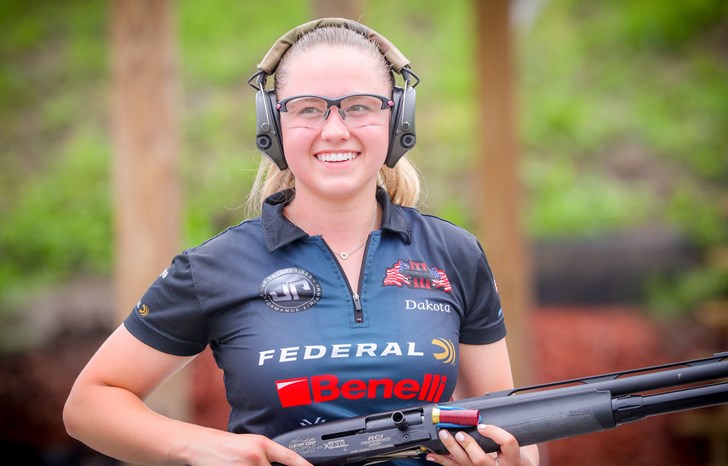
Overland suggests you keep track of the areas of your shooting with which you’re not happy, and then take a class, hire an instructor, watch pro shooters who instruct, or watch videos that will help you achieve your shooting goals. “If your budget is tight, sometimes just asking another shooter to meet you at the range to watch you shoot can yield helpful information. Ask if they see anything they do that you are not doing, in order to be successful,” she says.
“I also recommend recording yourself while you’re shooting or practicing, and going back and watching that video,” says Overland. “You will probably see things about your stance, for instance, or your grip, that you might not notice while you’re shooting.”
Practice quality over quantity. According to Overland, practicing by sheer volume is not the answer. “I noticed a huge difference in my shooting and my success once I started to become more consistent with my practicing,” she says. “Before that, I would practice without any real plan, and end up wasting time and ammo. But now every time I practice I make sure I have a plan that works towards my skill-specific goals. Everyone is built differently physically and mentally, so you have to figure out what works for you in order to get the most out of practice.”
Overland also suggests you look at the big picture for higher-quality practices. “For example, with long-range shooting, I am now focusing on making the shot. Hitting the target is much more important than just trying to go fast. I had to learn to take the time to breathe, pull the trigger correctly, and make sure that the sights are on. If I did all that before, my times would have been a whole lot faster.”
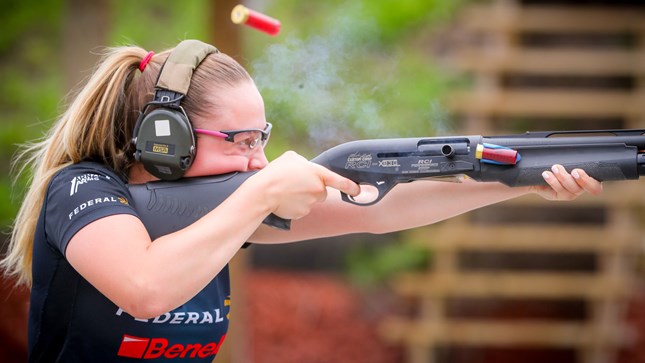
Change your mindset. “I feel that changing my mental game to one of more confidence has made the biggest difference for me in my competitions,” reflects Overland. “Confidence is everything when it comes to shooting. Confidence doesn’t have to mean that you go out thinking you’re definitely going to win. It means that you know that you’re capable of it. Confidence means doing as well as you want to and meeting the goals that you set for yourself.”
Overland says she firmly believes that you can’t have a losing mentality and be surprised when you lose. “If that’s the case, you really need to change your mental game. As long as you don’t shoot worse than you usually shoot and put what you can forward it will be good,” she says. “I started winning when I started to train my shooting and I stopped losing when I started to train my mental game. I came to the conclusion that proper, confident mindset is probably one of the most important if not the most important factors in my success.”
While preparing for an international competition in France, Overland practiced for several hours a day for four months. She placed third in the ladies division, but was very disappointed. “Looking back, I realize now I had very little confidence. I had no sense of mental game and how to handle myself,” she says. “I placed third in the ladies division, which was a podium finish, but I was still disappointed because I felt I could have done better.”
Then she read the book, “With Winning in Mind,” and says it changed her life. “Now, I repeat over and over that I am capable of winning. I feel that now that I have more confidence in my shooting ability, I have won all of my competitions lately. I would dedicate all of my success last season to my mental game.”
About the Author: Maureen P. Sangiorgio is an NRA-Certified Firearm Instructor/Range Safety Officer.
Additional Reading:
More Top Training Tips From Pro Shooters












